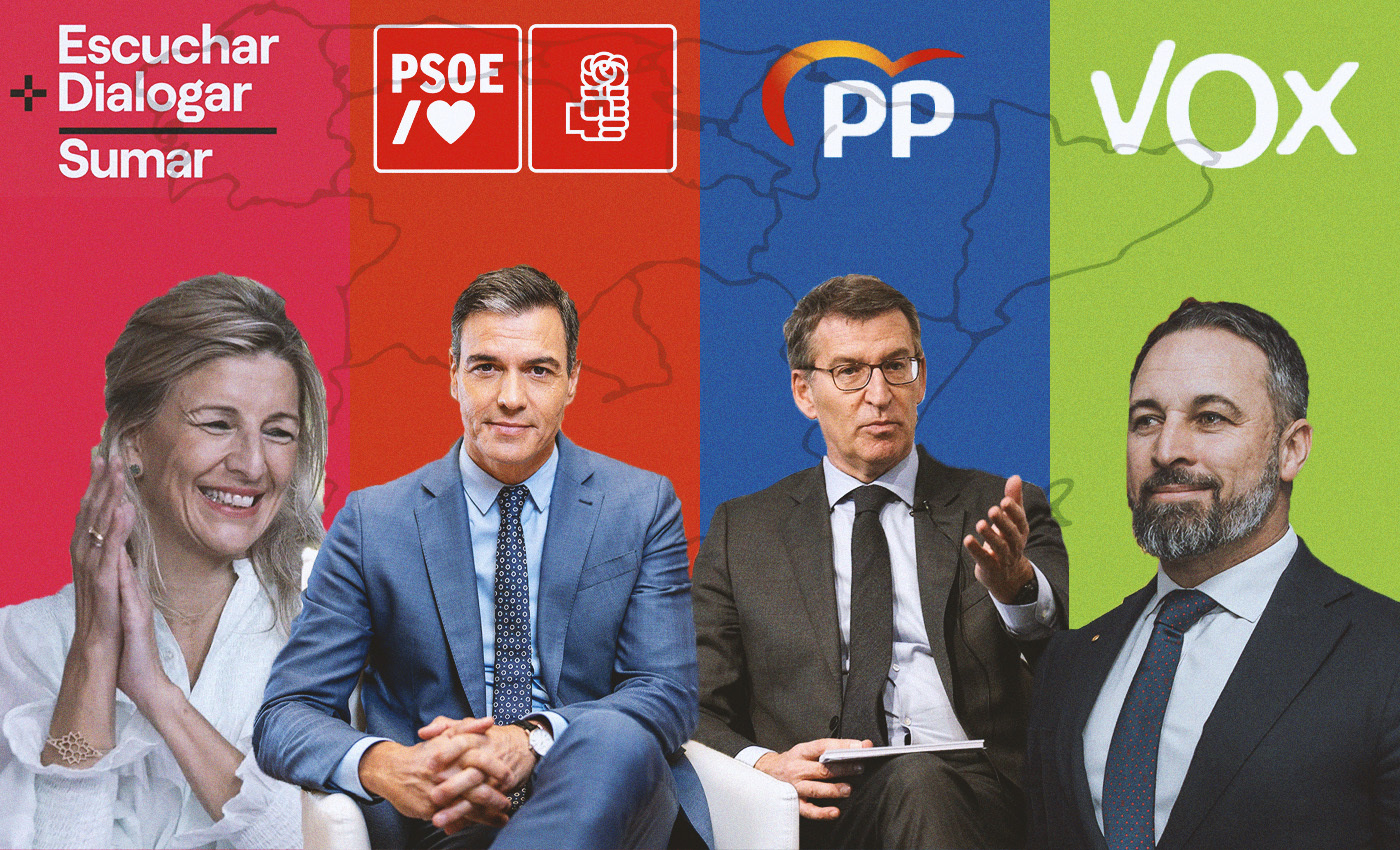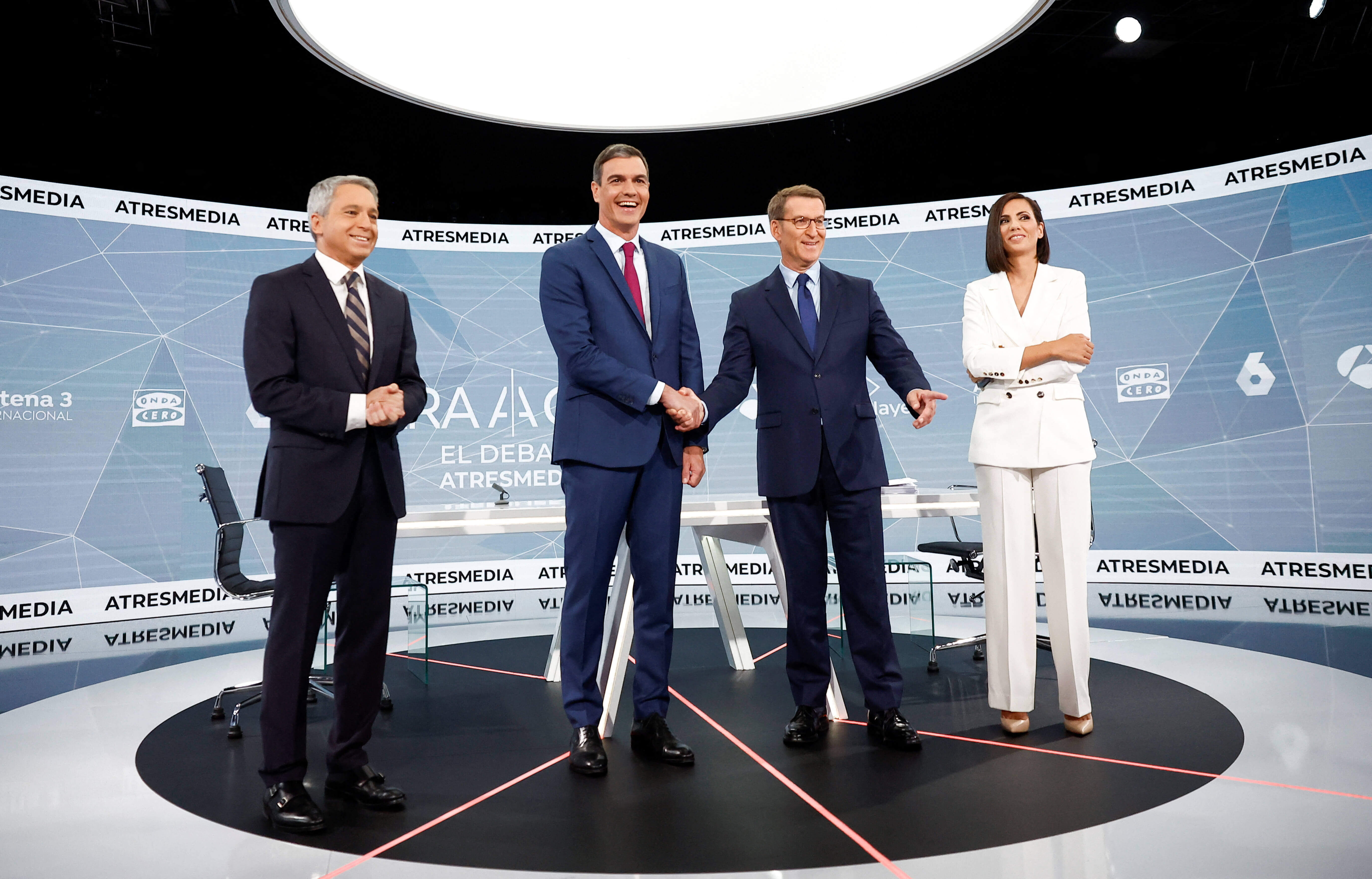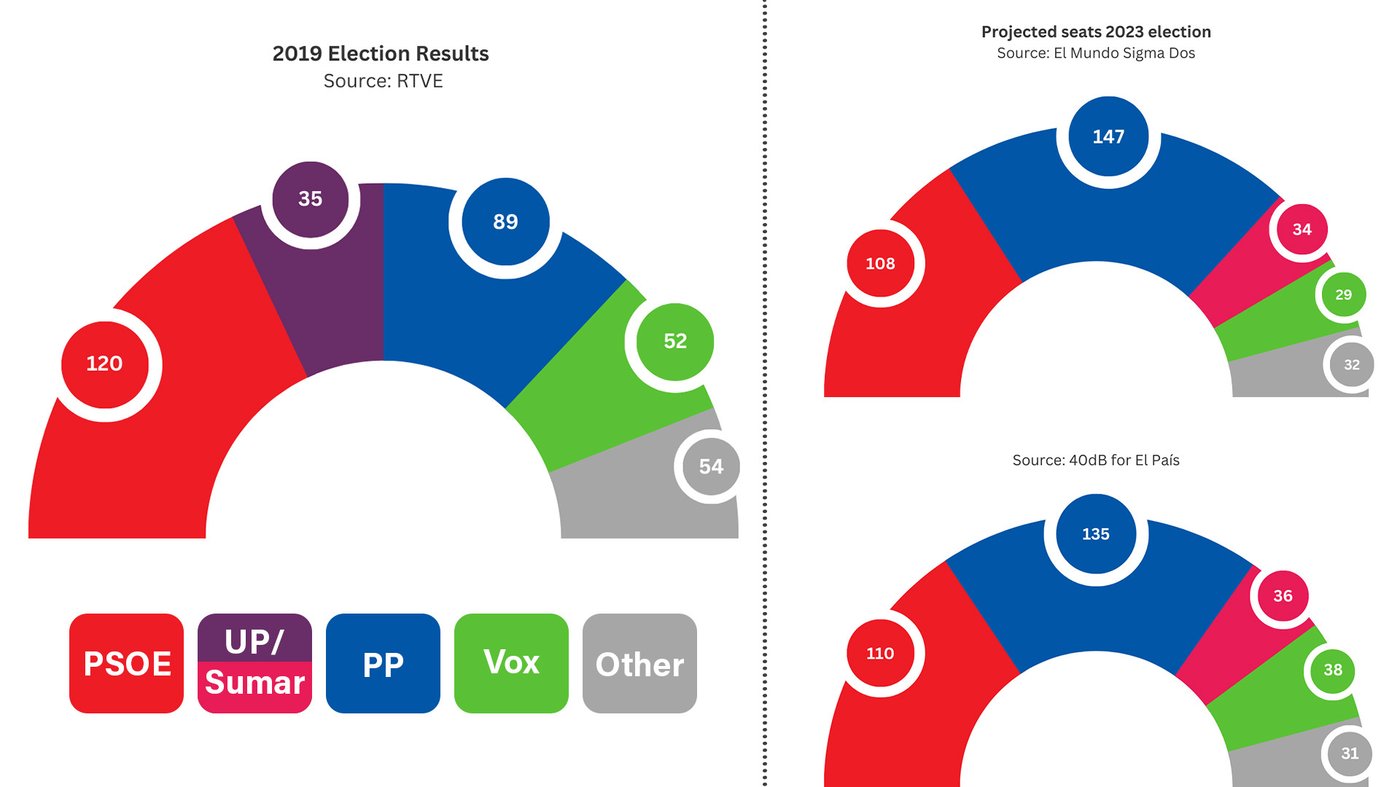By: lorena martinez
July 21 2023
The Spanish elections: Recurring misinformation stokes public distrust

Source: Reuters Connect/Composite by Logically Facts)
More than 37 million Spaniards are registered to vote and the country will head to the polls in a snap election on July 23, 2023, during the country's vacation season. The new prime minister (PM) will not only lead Spain but also the EU, as they will become the president of the European Council, a role that goes to an EU member state every six months, with Spain taking over at the beginning of July.
The current PM and leader of the Socialist Workers' Party (PSOE), Pedro Sánchez, has governed for over four years in a coalition with the far-left party Unidas Podemos (UP). However, UP is now campaigning under a larger leftist alliance, Sumar, helmed by Labor Minister Yolanda Díaz. The general elections were due to happen in December, but Sánchez called a snap election after suffering a significant blow in the regional and municipal elections on May 28.
All eyes are on the Spanish results on Sunday as many polls suggest the government could swing from a left-wing alliance to a right-wing coalition of the conservative People's Party (PP) and the far-right VOX, which would mark the first time a far-right party has been in a position of power since the end of Francisco Franco’s dictatorship, which lasted for 36 years.
In light of this potential swing to the right, Logically Facts has analyzed the misinformation and disinformation landscape in Spain and consulted experts and fact-checking organizations to understand how misleading and false information has shaped the campaign, and the challenges of keeping voters informed during a crucial moment for the country.
False claims and conspiracy theories camp widely in the Spanish land
In Spain – a country of over 47 million people – election-related conspiracy theories and hate content have been seen nearly 100 million times since January, according to the social media researchers at the non-profit technology and democracy organization Reset.
If you ask Spaniards, 78 percent say they often come across information that distorts reality and may even be fake. 86 percent believe this presents a problem for democracy, according to a survey from the winter 2022-2023 Eurobarometer, the polling arm of the European Commission.
These figures show the country's issue with misinformation, which intensifies during elections as they provide the perfect setting for hoaxes and conspiracy theories to take hold. Some false claims circulated during this campaign were related to inaccurate data on unemployment and pensions, misleading claims targeting minorities, and questioning climate change, among others.
Reset researchers found that VOX "usually attacks women, migrants, religious minorities and LGTBQ+ people in their race to reach the top of the polls" and warns that "racist and homophobic narratives that were previously lesser seen in Spanish society are now reaching a wider audience in social media platforms due to the far-right party’s strategy."
Claims undermining trust in the electoral process have taken up much of fact-checkers' time, particularly with election day approaching, and misleading claims about electoral fraud (“pucherazo”) spreading across social media platforms.
Electoral fraud, the misleading narrative that never dies
"If you are away from the city where you are normally registered to vote, you will not be able to vote by post" and "Electoral fraud in Madrid. 67,000 ballots have disappeared." Do these statements sound familiar? These recurring misleading claims – shared once again during this electoral campaign – aim to cast doubt about the electoral process and try to make the case, without evidence, that there is electoral fraud.
Myriam Redondo, a journalist and expert in misinformation and disinformation and a professor at Complutense University in Madrid, has seen it all before, telling Logically Facts that "electoral fraud was the biggest false claim shared in the U.S. during the 2020 election, and since then, I have seen it too in all the elections in Spain." This is a reminder of how misinformation travels fast and far from one country to another and is easily replicated, regardless of local circumstances.
Another factor causing misleading claims involving mail ballots to spread is the rise in the number of people registered to vote by mail. This figure rose from 1.9 million in the April 2019 elections to 2.6 million in the current election cycle – a 94.71 percent increase.
One of the latest misleading narratives, popular among the far-right and also some politicians is the suggestion that nearly half a million people will be unable to vote. Correos, the Spanish institution that handles mail ballots, stated this figure is the number of people who had missed attempted deliveries of their postal ballots – people must present their national ID and sign for any ballot delivery. However, these ballots were still available for collection at the post office. This demonstrates "how information may start with a grain of truth and may even be official information, but it gets subverted to produce misinformation," according to Irene Larraz, political fact-check lead at Newtral, to Logically Facts.
Experts have also spotted a trend that Redondo calls “enchained disinformation and misinformation.” In this case, people do not share a direct false claim but instead, plant a seed of doubt. In Redondo’s example, "A relevant journalist may not directly say there is electoral fraud on TV or radio, but says that there are rumors that electoral fraud could happen. And then you see many people talking about the same topic, and start believing that electoral fraud is happening because these people are talking about it without any evidence."
Fighting misinformation: A fact-checking and media alliance
Newtral, EFE Verifica, Maldita.es, VerificaRTVE, Verificat, and more than 20 other media outlets have joined forces in Spain to fight misinformation during the general elections. Their aim is to "amplify the verification to have more impact when it comes to denying the hoaxes that circulate," explains Larraz.
This alliance is called Comprobado (Checked in English), and it functions by collecting fact-checking organizations’ checks into a central repository on one website. These checks can then be used by media outlets, which share them in their channels. This means verified information reaches more readers as it is published multiple times.
The homepage of Comprobado, which brings together fact-checks from all organizations that participate in this initiative
Sergio Hernández, head of EFE Verifica, is keen to point out to Logically Facts that with the alliance, "we are able to refute more false claims since we have shared the workload and exchanged efforts to publish each other's work. This also reinforces cooperation between the organizations that fight against misinformation."
Live TV electoral debates: To fact-check or not to fact-check?

Debate: Spanish People's Party candidate Alberto Nunez Feijóo and Spain's Prime Minister and Socialist candidate Pedro Sanchez pose, with journalists Vincente Valles and Ana Pastor, before a televised debate ahead of snap election, July 10. Image: REUTERS
The current PM and PSOE leader, Pedro Sánchez, and the main opposition leader of the conservative People’s Party (PP), Alberto Núñez Feijóo, took part in a two-hour TV debate which was characterized by both shouting over each other, interrupting, and accusing the other of lying.
This head-to-head debate revealed "the high level of confusion that this election has brought," and Hernández explains that both politicians used firehosing, a disinformation technique to share large amounts of information that may or may not be accurate, to confuse the opponent and the audience.
As a result, the debate raised criticism about why there was no live fact-checking, or any clarification from the moderators when both candidates shared misleading and false information. Newtral founder and journalist Ana Pastor, one of the two moderators in the debate, addressed criticisms in an interview, stating “In my head, I was wrestling with whether to clarify some numbers and interrupt more. But if I did this, it would have become an interview. And you also have to decide in a split second why to clarify some information and not other pieces of information. Do I do them all? There is no simple answer."
There is no doubt that live fact-checking is a challenge. The main process of verifying claims involves analyzing the full context, finding many primary sources, contacting experts and official entities to either support or refute the information, and detailing the path the fact-checker followed to find the evidence. The final piece needs to pass several levels of review. This cannot be easily done during a live debate when the candidates throw out figures and statistics on issues as if they were counting from 1 to 10.
When considering how to check such debates as they happen, Redondo thinks that "in the future, AI will come to our aid, at least to cover the most basic lies, those that follow a pattern or data, which are easier to debunk." Artificial intelligence is certainly something to explore for fact-checking – live fact-checking in particular – where so much information and data points are thrown out in a short period of time.
What could the electoral results mean for polarization and misinformation in Spain?
One of the issues that defines the current social situation in Spain is that such polarization is growing at different levels. The Spanish misinformation and disinformation landscape "stands out for its acute political and media polarization, usually in misleading content," states researcher Ana Romero in a report for the EU DisinfoLab. This then refracts in society, with families refusing to speak to each other because they voted for different political parties, and WhatsApp groups exploding with arguments over false claims that are shared and people subsequently falling for them.
On the polarization issue, Tomás Rudich, debunking lead at Newtral, pointed out to Logically Facts that "regardless of who governs, the general reflection is that the more polarization there is, the more this becomes a breeding ground for disinformation and misinformation. This is exactly what happened in the U.S. and Brazil. As long as society, the media, and social media platforms are more polarized, and the environment is more tense and aggressive, mis- and disinformation will tend to spread more widely."
Misinformation experts are cautious when analyzing any potential outcomes until after the results. Redondo thinks that misinformation "is going to continue whoever wins. It is rooted in the political system, and it does not matter who governs; it will continue."
Most polls predict that the conservative PP party will gain the most votes, but will likely need the support of VOX, and its leader Santiago Abascal, to govern.
 Graphic: Results of the 2019 elections and projected results for the 2023 elections.
Graphic: Results of the 2019 elections and projected results for the 2023 elections.
In Spain’s case, "the bulk of false claim sharing comes from supporters of radical right ideologies," pointed out Carmela Ríos, journalist and professor of social media and fact-checking.
If the far-right VOX forms part of the government, the question is whether misinformation in the country will rise as in Brazil when Bolsonaro came to power, and likewise in the U.S. with Trump, and how fact-checkers will manage the challenge of counteracting it.


